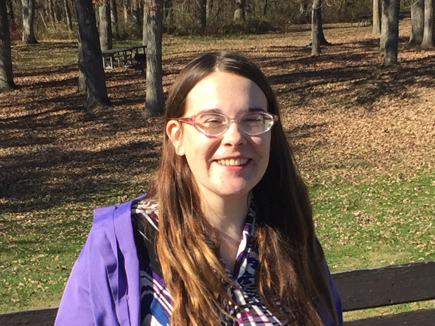Rachel Crowell
Freelance Math and Science Journalist/Writer
Education: B.S. Mathematics and Statistics, University of Missouri–Kansas City
Career stage: Early

What do you do?
As a self-employed professional, I manage all activities of my business, such as cultivating and maintaining relationships with clients, developing and pitching new story ideas to publications (or deciding whether to accept new assignments they bring to me), interviewing sources, and writing articles. I then respond to editors/clients’ requests for revisions, participate in the fact-checking process, and invoice for payment. I also maintain my professional social media presence.
I find it most rewarding when I talk with mathematicians and other researchers who are enthusiastic about their research and excited to discuss it with others. It’s also satisfying when my articles are published and ready to be enjoyed by others.
What types of skills do you use?
To succeed as a science writer, you must learn how to read and analyze research papers. Interpersonal communication skills are also critical, as you’ll need to be able to talk with mathematicians and scientists and work with editors/clients. This process needs to culminate in a finished product that’s understandable to your audience (which often includes lay readers). Time management skills and attention to detail are also helpful.
How are applied mathematics and/or computational science important to what you do?
Having a degree in math and statistics helps me market myself and my business. It also gives me confidence to tackle writing about these subjects and find exciting research developments to cover.
Does your job offer flexibility?
Yes, being self-employed offers flexibility, with some caveats. With this income structure, you don’t have paid vacation or sick leave in the same way that employees do. Also, self-employment taxes tend to be higher.
Does your job offer flexibility?
Yes, I have had the opportunity to collaborate with different teams to develop solutions to interesting challenges across commercial, defense, and space.
What career path did you take to your current position?
I earned my bachelor’s degree in mathematics and statistics. I then completed an American Association for the Advancement of Science (AAAS) Mass Media Science and Engineering Fellowship sponsored by the American Mathematical Society. My fellowship site was the Oregonian, a newspaper in Portland, Oregon. I also recently participated in a mid-career mentorship program for science writers through the National Association for Science Writers that served as an additional professional development opportunity for me.
Was your career path well planned or a result of taking opportunities as they arose?
It was the result of taking opportunities as they arose. I had considered many career paths and just before I graduated, a math professor in my department shared an announcement about the AAAS Mass Media Fellowship. As soon as I started my fellowship, I knew I wanted to have a career in science writing.
What advice would you give to someone pursuing a similar degree or profession?
Join the National Association of Science Writers to connect with learning and networking opportunities. (Student and affiliate memberships are available.) Apply for science writing internships and fellowships (such as the AAAS Mass Media Fellowship) if you’re eligible. Ask about opportunities to write for publications on your university campus and submit articles to SIAM News.
Salary
Salaries vary widely based on the types of clients you serve, how many projects you accept and the scope of the projects you tackle. There are also many different payment structures (such as getting paid a rate per word, per hour, or per project) used in the industry.
Stay Up-to-Date with Email Alerts
Sign up for our monthly newsletter and emails about other topics of your choosing.

